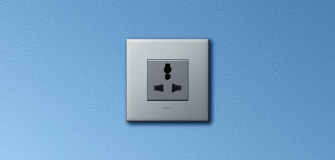The Importance of MCBs and MCCBs in Electrical Circuit Protection
You are at home winding down after a long day. Your appliances are working properly to ensure that you do not experience any issues. Life is good, and then a sudden spark happens, followed by complete darkness.
Your heart skips a beat as the smell of burnt plastic lingers in the air. You rush to check the fuse box, hands trembling. It is a short circuit. But it could have been worse, like a fire or a life-threatening accident.
But it didn’t happen because your MCB stepped in. It cut the power before disaster struck. You reset it, take a deep breath, and get on with life.
This is not a worst-case scenario; this is real. Electrical overloads and short circuits happen every single day in homes, offices, and factories. When they do, the only thing standing between safety and disaster is a tiny as well as unassuming device—your MCB or MCCB.
Let’s talk about why these little lifesavers matter.
What is an MCB?
You can think of an MCB (Miniature Circuit Breaker) as a safety device for your electrical system. It watches over the current flowing through your home, making sure nothing goes wrong. The moment it detects too much load or a short circuit—it acts instantly.
An MCB simply trips, unlike old-school fuses that burn out and leave you in the dark. Flip the switch, and the power is back. There is no hassle and stress when you have MCBs installed. You will get reliable protection that works.
What is MCCB?
So, what is MCCB? An MCCB (Moulded Case Circuit Breaker) is an advanced version of an MCB. While an MCB protects your home, an MCCB safeguards industries, large offices, and factories where electrical loads are massive. But nowadays, MCCBs are becoming an inseparable part of electrical wiring in residential properties.
Imagine a factory filled with machines running 24/7. If something goes wrong—if a motor draws too much current or a compressor overheats—an MCCB cuts the power instantly. Without it, a single spark could shut down an entire operation.
Why Does Every Home and Office Need Them?
Most people do not think about electricity. It is there to power our lives. Flip a switch, press a button, plug something in—it works. But there can be situations when electrical hazards will compromise your safety.
Here is the truth: electrical failures do not give warnings. There is no notification saying, “Hey, your circuit is about to overload.” It just happens. When it does, you have two choices:
- Hope nothing bad happens.
- Have an MCB or MCCB in place to shut things down before danger strikes.
For homes, an MCB protects your TV, fridge, AC, and every other appliance you rely on. For offices and homes with heavy power requirements, MCCBs handle the heavier electrical load. These devices ensure appliances and machinery keep running safely.
MCCBs are the difference between a functioning business and a catastrophic shutdown for factories.
Different Types of MCCBs and Why They Matter
Note that not all MCCBs are the same. They come in different types. Each MCCB is built for specific needs. Here is what you should know.
- Type B: These MCCBs are for homes and small offices. They trip when the current is three to five times the maximum load.
- Type C: These MCCBs are for businesses operating motors, transformers, and industrial lighting.
- Type D: Type D MCCBs are built for lifts as well as compressors.
- Type K: This type of MCCB is ideal for feeder protection in industrial settings.
- Type Z: It is the most sensitive type of MCCB. It is designed for delicate electronics.
Each one plays a crucial role. Choosing the right MCCB means the difference between flawless electrical safety and a system constantly at risk.
Overview of the MCB Working Principle
The MCB working principle is not magic—it is smart engineering. It operates using two key mechanisms:
Thermal Protection:
A small metal strip inside the MCB heats up if an overload occurs. When it bends, the circuit breaks, stopping the flow of electricity before wires overheat.
Magnetic Protection:
An electromagnet inside the MCB kicks in and instantly shuts off the power if a sudden short circuit happens.
MCBs are fast and can save lives.
MCCB Ratings and Features—What to Know Before Buying?
You need to understand what it’s built for before choosing an MCCB.
- Rated Frame Current: The highest current it can handle.
- Current Rating: The exact level at which it trips.
- Insulation Voltage: How much voltage it can withstand before failing.
- Operational Voltage: The voltage it’s designed to manage daily.
- Breaking Capacity: The amount of fault current it can interrupt.
- Mechanical and Electrical Life: How many times it can trip before wearing out.
Selecting the wrong MCCB is like wearing the wrong size shoes. It would not work properly, and sooner or later, it will cause problems.
MCB vs MCCB: Which One Do You Need?
Here’s the simple answer:
- Get an MCB if you are protecting a small home or small office.
- You need an MCCB if you need to safeguard a large residential property or a factory.
Note that both these devices work to prevent electrical disasters. The difference between them is scale.
The Bottom Line
Electricity is a silent force. When everything works, we barely notice it. But the moment something goes wrong, the consequences can be devastating. A short circuit can start a fire, and a voltage spike can destroy appliances. But it doesn’t have to be this way with the installation of MCBs and MCCBs.
These are not technical devices. They are the difference between safety and disaster. If you care about protecting your home, office, or business, choose safety and reliability. Choose Legrand—a trusted name in moulded case circuit breaker and MCBs that ensure your electrical circuit stays where it should: safe, stable, and under control. The company has over two decades of experience in manufacturing high-quality MCBs and MCCBs for the Indian market.




















